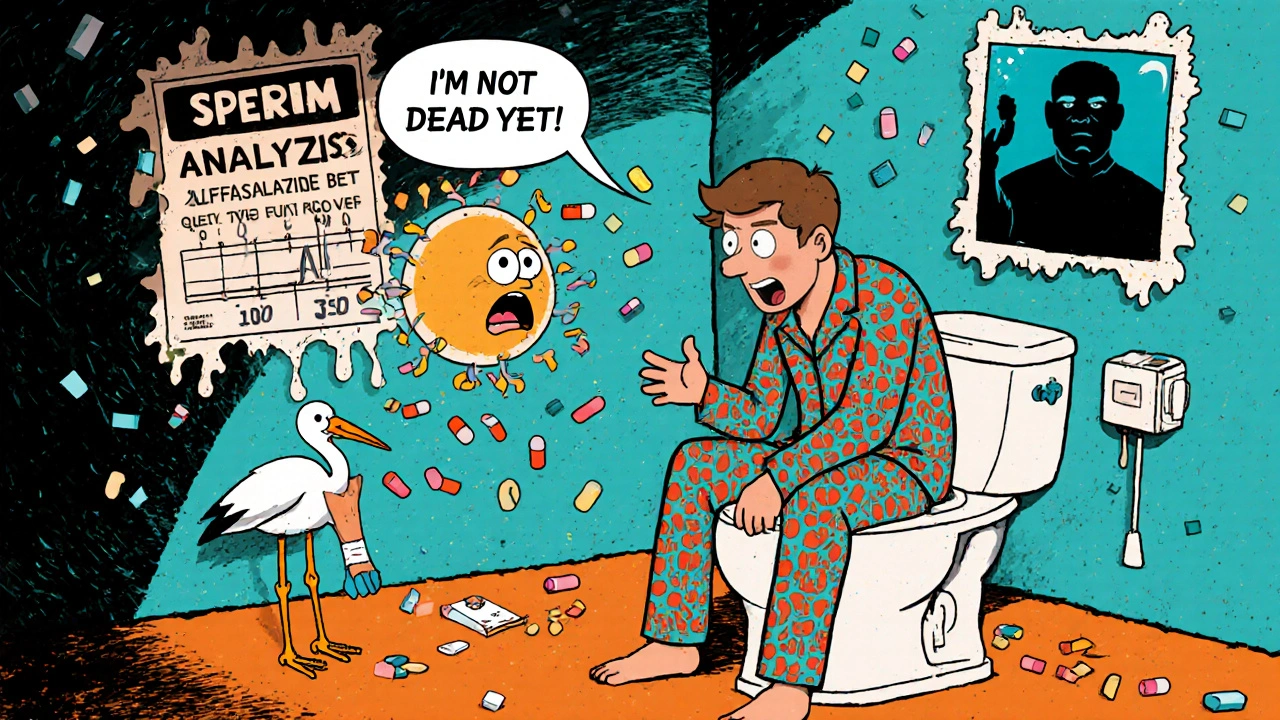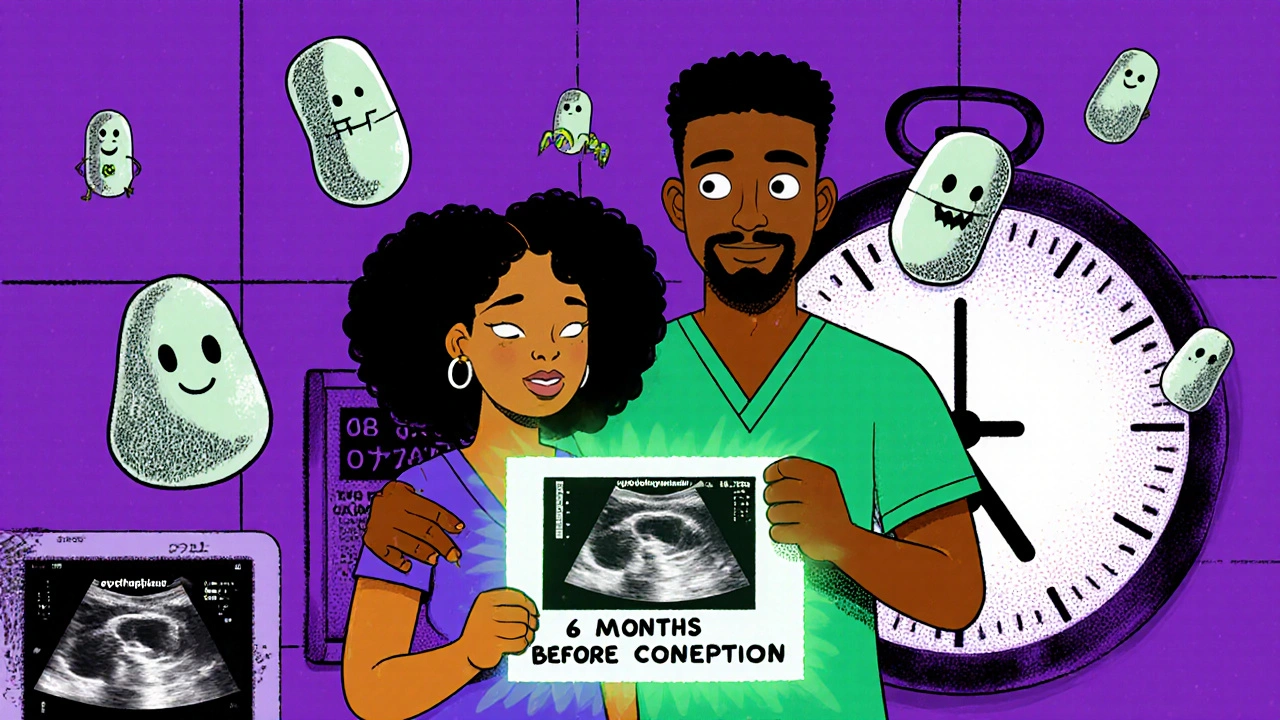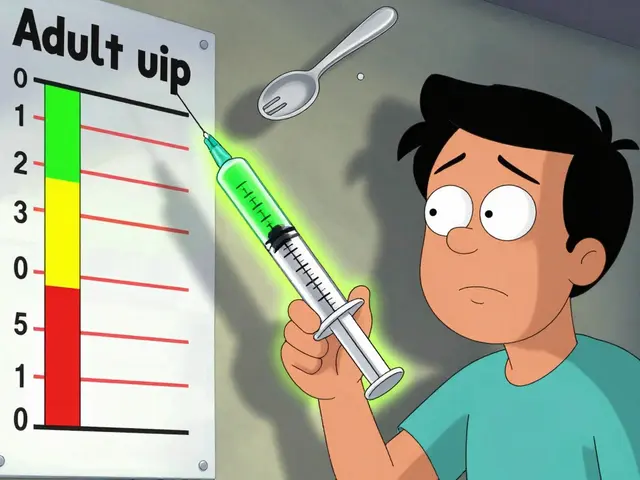Immunosuppressant Pregnancy Risk Checker
Check Medication Safety for Pregnancy
Select medications and gender to see risk assessment
Planning a pregnancy while on immunosuppressants isn’t something most people expect to navigate. But for those managing autoimmune diseases like lupus, rheumatoid arthritis, or who’ve had organ transplants, it’s a real and urgent question. Can you get pregnant safely? Will the drugs harm your baby? Can you even conceive? The answers aren’t simple, but they’re not impossible either. With the right planning and medical guidance, many people on these medications go on to have healthy children. The key is understanding which drugs are risky, when to switch them, and how to monitor for hidden dangers-before you even try to conceive.
Not All Immunosuppressants Are Created Equal
It’s easy to think of immunosuppressants as one group, but they’re not. Some are relatively safe during pregnancy. Others can cause permanent damage to fertility or serious birth defects. The difference isn’t subtle-it’s life-changing.Azathioprine is one of the safest options. Over 1,200 pregnancies have been tracked in studies, and there’s no increased risk of birth defects, miscarriage, or developmental issues. It’s often the go-to choice for women who need to stay on immunosuppressants while pregnant. For men, it doesn’t affect sperm quality either.
On the other end of the spectrum is cyclophosphamide. This drug, used for severe autoimmune conditions, can permanently destroy ovarian tissue. In women, doses over 7g/m² lead to permanent infertility in 60-70% of cases. In men, it causes irreversible azoospermia (no sperm) in about 40% of users. If you’re on this drug and thinking about having kids, fertility preservation-like egg or sperm freezing-should be discussed before starting treatment.
Methotrexate is another big red flag. It’s a known embryotoxin. Even small amounts can cause severe birth defects. You must stop taking it at least three months before trying to conceive. Many doctors recommend waiting six months to be extra safe. The same goes for chlorambucil, which is linked to kidney, heart, and urinary tract defects in babies. Breastfeeding is also off-limits if you’re on chlorambucil.
Then there’s sirolimus. It’s been linked to miscarriages in early case reports-up to 43% of pregnancies ended in loss. It’s currently contraindicated during pregnancy. Belatacept is newer and looks promising, with three documented pregnancies resulting in healthy babies, but there’s still too little data to call it safe. Stick with azathioprine unless your doctor has a strong reason to switch.
Steroids and Hormones: The Hidden Fertility Disruptors
Prednisone and other corticosteroids are commonly used and often thought of as harmless. But they’re not innocent when it comes to reproduction. These drugs interfere with the signals that control ovulation in women and sperm production in men. In women, they can lead to irregular cycles or even stop ovulation altogether. In men, long-term use can lower testosterone and reduce sperm count.Even if you’re still ovulating, steroid use during pregnancy increases the risk of premature rupture of membranes by 15-20%. That means your water breaks too early, which can trigger preterm labor. It’s not a guarantee-but it’s a real enough risk that your doctor should be monitoring you closely if you’re on steroids and pregnant.
For men, the effects are less obvious but still important. Steroids can reduce sperm motility and morphology. If you’re trying to conceive, your doctor may recommend checking your sperm count before and after starting steroids. The good news? These effects are usually reversible once you stop the medication.
Male Fertility: The Overlooked Side of the Story
Most people focus on the woman’s health when planning a pregnancy. But the man’s medication matters just as much. Sulfasalazine, often prescribed for Crohn’s disease or ulcerative colitis, cuts sperm count by 50-60%. That’s a big drop. But here’s the relief: it’s completely reversible. Once you stop taking it, sperm counts bounce back in about three months.That’s why timing matters. If you’re planning to conceive, talk to your doctor about switching to an alternative like mesalamine before you stop using contraception. Don’t wait until you’ve been trying for months with no luck. Get your sperm checked early. The FDA recommends semen analysis at baseline, after one full spermatogenic cycle (about 74 days), and again 13 weeks after stopping the drug. These aren’t just suggestions-they’re the standard of care.
And here’s the uncomfortable truth: many older immunosuppressants were approved before manufacturers had to test for male fertility effects. That means there’s a lot we still don’t know about how drugs like mycophenolate or azathioprine affect sperm. Newer drugs are held to stricter standards, but if you’re on an older one, assume there’s a risk until proven otherwise.

Preconception Counseling Isn’t Optional-It’s Essential
You wouldn’t start a marathon without training. Why start a pregnancy without preparing your body and your meds? Preconception counseling means meeting with your rheumatologist, transplant specialist, and a fertility expert at least three to six months before you plan to conceive.This isn’t just a chat. It’s a plan. You’ll need to:
- Switch from high-risk drugs (like methotrexate or cyclophosphamide) to safer ones (like azathioprine)
- Confirm your disease is stable-active inflammation increases miscarriage risk
- Check kidney and liver function-high creatinine levels (above 13 mg/L) raise the risk of preeclampsia
- For men: get a semen analysis
- For women: assess ovarian reserve if you’ve had cyclophosphamide
Dr. Clara Leroy points out that the risk of your autoimmune disease flaring up during pregnancy-because you’ve lowered your meds-is only 2-5%. That’s low. But the risk of birth defects from the wrong drug? Much higher. So the trade-off is worth it.
Many transplant centers now have formal protocols for pregnancy planning. In fact, 85% of them do. If yours doesn’t, ask why. You deserve a structured approach, not guesswork.
What About Breastfeeding?
Many parents worry about whether they can breastfeed while on immunosuppressants. The answer depends on the drug.Azathioprine is considered safe. Only tiny amounts pass into breast milk, and studies show no harm to infants. In fact, it’s often the preferred choice for mothers who want to nurse.
Chlorambucil? Absolutely not. It’s known to enter breast milk and can suppress the baby’s immune system. The same goes for cyclophosphamide-avoid breastfeeding while on it.
For drugs like tacrolimus or ciclosporine, the data is mixed. Some experts say it’s okay with monitoring; others say avoid it. Talk to your pediatrician and your specialist. Don’t assume it’s safe just because you’re on a "low dose."
The New Frontier: Belatacept and What’s Coming
Newer drugs like belatacept are giving hope. So far, three women who took it during pregnancy gave birth to healthy babies. No birth defects. No major complications. That’s promising. But three cases aren’t enough to call it safe. We need more data.That’s why registries are being created. Hospitals and research groups are now tracking pregnancies in women on newer immunosuppressants. If you’re on one of these drugs and get pregnant, consider joining one. Your data helps future parents.
Also, the FDA and EMA now require drug makers to test for male reproductive toxicity in clinical trials. That means future drugs will come with clearer safety data. But the ones you’re on now? They were approved in a time when no one asked if they affected sperm.

What You Can Do Right Now
If you’re on immunosuppressants and thinking about kids:- Don’t wait. Start talking to your doctor now-even if you’re not ready to conceive.
- Get a list of every medication you’re taking. Mark which ones are high-risk.
- Ask for a referral to a fertility specialist or maternal-fetal medicine expert.
- If you’re male, request a semen analysis.
- Ask if you can switch to azathioprine or another safer option.
- Consider fertility preservation if you’re on cyclophosphamide or planning high-dose treatment.
There’s no shame in needing help. This isn’t about being "broken." It’s about being smart. The science has come a long way since 2000, when doctors had almost no data on children born to parents on these drugs. Now we know enough to make safe choices. You just need to ask the right questions-and act before it’s too late.
Long-Term Risks for the Child
Even if your baby is born healthy, the story doesn’t end there. Babies exposed to immunosuppressants in the womb have lower B-cell and T-cell counts in their first year. That means they’re more likely to get infections. One study found a 2.3-fold higher risk of serious infections in the first 12 months.That doesn’t mean your child will be sick. But it does mean you need to be vigilant. Keep up with vaccinations. Don’t skip well-baby visits. Tell your pediatrician about the exposure so they can monitor immune development.
And while we know a lot about birth defects and early development, we still don’t know much about long-term outcomes. Are these kids more likely to develop autoimmune diseases themselves? Do they have learning differences? Are their immune systems permanently altered? These are open questions. More research is needed-and your participation in follow-up studies can help answer them.
Can I get pregnant while taking azathioprine?
Yes. Azathioprine is one of the safest immunosuppressants for pregnancy. Over 1,200 documented pregnancies show no increased risk of birth defects, miscarriage, or developmental issues. It’s often the preferred drug for women who need to continue immunosuppression while pregnant. For men, it doesn’t affect sperm quality.
How long before pregnancy should I stop methotrexate?
Stop methotrexate at least three months before trying to conceive. Many doctors recommend waiting six months to ensure the drug is fully cleared from your system. Methotrexate is a known embryotoxin and can cause severe birth defects even in small amounts.
Does cyclophosphamide cause permanent infertility?
Yes, in many cases. In women, cumulative doses over 7g/m² cause permanent ovarian damage in 60-70% of users. In men, it can cause irreversible azoospermia in about 40%. If you’re planning to have children and need this drug, discuss fertility preservation-like egg or sperm freezing-before starting treatment.
Can I breastfeed while on immunosuppressants?
It depends on the drug. Azathioprine is considered safe for breastfeeding. Chlorambucil and cyclophosphamide are not-they pass into breast milk and can suppress the baby’s immune system. For drugs like tacrolimus or ciclosporine, the data is limited. Always consult your doctor and pediatrician before breastfeeding.
Should men on immunosuppressants get a semen analysis?
Yes. Drugs like sulfasalazine can cut sperm count by 50-60%, and cyclophosphamide can cause irreversible infertility. The FDA recommends semen analysis at baseline, after 74 days of exposure (one full spermatogenic cycle), and again 13 weeks after stopping the drug. This helps determine if fertility is affected and when it might recover.
Is sirolimus safe during pregnancy?
No. Sirolimus is currently contraindicated during pregnancy. Early case reports show a 43% miscarriage rate, along with cases of structural malformations. Even though animal studies show no direct toxicity, the human data is too risky to ignore. Avoid it if you’re planning to conceive.
What’s the biggest mistake people make when planning pregnancy on immunosuppressants?
Waiting too long to talk to a doctor. Many people assume they can just stop the meds and try to conceive right away. But switching drugs, stabilizing disease activity, and monitoring fertility takes months. Starting the conversation early-ideally 6 months before trying-is the single most important step to a healthy pregnancy.
Next Steps: What to Do Today
If you’re on immunosuppressants and thinking about having a child:- Make a list of all your medications and their risks.
- Call your rheumatologist or transplant team and ask: "Do we have a pregnancy plan for me?"
- Ask for a referral to a maternal-fetal medicine specialist or fertility expert.
- If you’re male, request a semen analysis.
- If you’re female and on cyclophosphamide, ask about egg freezing.
- Don’t stop or change your meds on your own. Work with your team.
You’re not alone. Thousands of people have walked this path before you. With the right planning, you can have a healthy pregnancy and a healthy child. But you have to start now-not when you’re already pregnant.



Azathioprine being the safest option is such a relief. I’ve been on it for lupus for five years and just found out I’m pregnant. My rheumatologist said it was fine, but I was terrified. Reading this made me cry in the best way. No more panic googling at 3 a.m. Thank you for laying this out so clearly.
So let me get this straight-we’re supposed to freeze our eggs or sperm because some drug company didn’t test their meds on fertility before selling them like candy? And now we’re the ones doing the emotional labor of planning a whole damn baby around pharmaceutical negligence? I’m exhausted. But also… yeah, this is real. And I’m doing it anyway. 💪
Okay, but let’s be real-how many of these women even made it to pregnancy? I’ve seen so many threads where someone says ‘I’m on azathioprine and got pregnant!’ and then three months later they’re like ‘my baby had a heart defect’ or ‘I had a stillbirth’ and the comments are just ‘you’re so brave!’ like that’s the point. No one talks about the 80% of people who can’t conceive at all, or who lose three cycles before they even get to the ‘safe drug’ phase. And don’t get me started on men-sperm analysis? Who even does that? My cousin’s husband waited a year to get tested because he thought it was ‘weird’ and now they’re paying for IVF. This whole thing is a minefield disguised as a checklist. And don’t even mention the cost-fertility preservation isn’t covered by insurance if you’re not ‘infertile’ yet. So we’re supposed to pay $15k to save a future we’re not even sure we’ll get? This isn’t healthcare. It’s a survival game.
Start the conversation now. Not next month. Not when you’re ‘ready.’ Now.